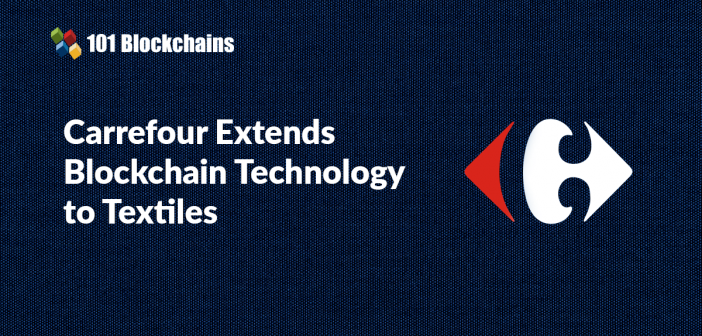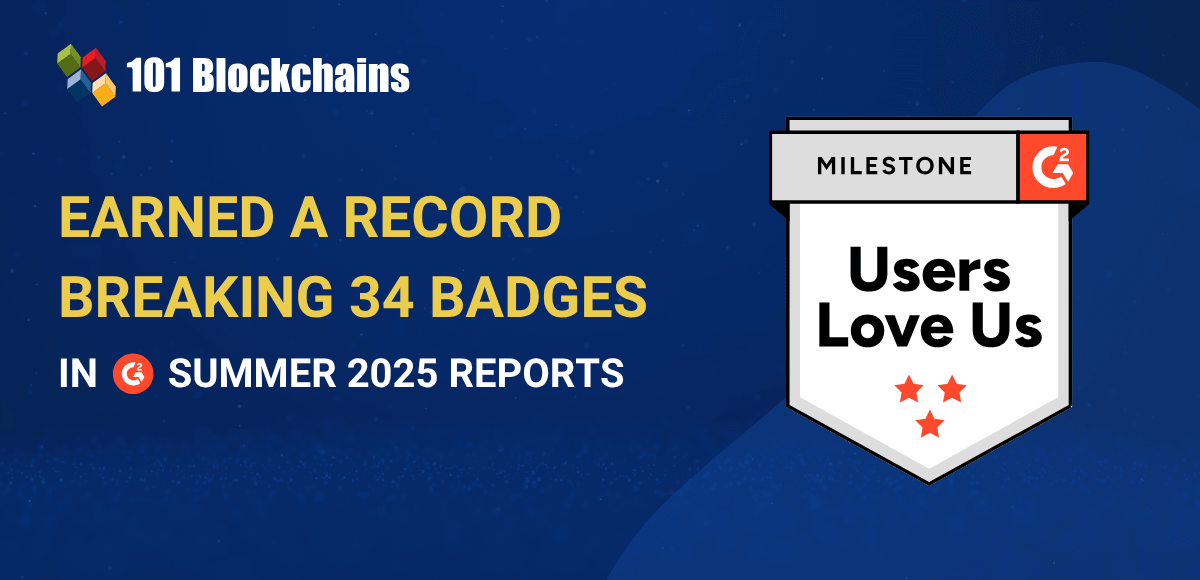Learn how blockchain truly works, master key definitions, and uncover what makes smart contracts so "smart." Dive into the fundamentals, gain valuable insights, and start your blockchain journey today!

- News & Updates
101 Blockchains
- on April 06, 2021
Carrefour Expands Blockchain Technology to Textiles
French supermarket giant, Carrefour, is making giant strides in blockchain adoption by extending the use of blockchain technology in textiles. Now, the supermarket chain will utilize blockchain for tracing its textile products. Carrefour joined the IBM Food Trust as a founding member in 2018. The supermarket chain has successfully leveraged blockchain technology for tracing food products only.
An official release from the company revealed that the move towards textile would leverage the same technology as IBM Food Trust. In addition, textile products will be the first non-food products tested for blockchain traceability by Carrefour.
The retailer announced that expansion of blockchain use in tracing textiles would focus on tracing 450 products in TEX line. TEX is the exclusive textile brand of Carrefour and deals with bed linen and baby bodysuit products. Carrefour will start the use of blockchain technology for tracing 450 baby onesies and bedding products in Spain and France. The supermarket chain also expressed hopes regarding future plans for extending blockchain tracing to additional textile products in other countries.
Enroll Now: Enterprise Blockchains Fundamentals – Free Course
Carrefour created an extension of TEX, known as TEX BIO, for achieving better sustainability in textile production. TEX BIO is primarily focused on production of baby clothes and home textiles from purely certified organic cotton. TEX BIO cotton provides the assurance of non-GMO standard manufacturing.
Carrefour, which has large-scale operations in France, as well as Brazil and Spain, partnered with Nestle in 2019 to use the blockchain technology for potato puree, offering information about the supply chain, the variation of potatoes used and manufacturing facilities.
In addition, Carrefour also states that the TEX BIO cotton is cultivated without any synthetic pesticides. The company also stated that the cotton is grown in certified farms according to the basic precedents of organic production. Now, Carrefour aims at the implementation of blockchain throughout the supply chains of all TEX BIO products.
How Does Blockchain Technology Come Into the Equation?
Blockchain technology offers a reliable instrument for digitally storage and transmission of immutable information with security. It can work as the database or registry, with a history of all the interactions between users since its creation. The database cannot be modified, thereby offering the assurance of security.
Carrefour will use blockchain for helping consumers in accessing data regarding the product through scanning a QR code. Consumers could scan the QR code by using their smartphones, thereby ensuring ease of ease. The QR code can help in accessing vital information about the product.
The information might include the method of cotton cultivation, environment-related certificates, and composition of the product. Therefore, the use of blockchain technology can help consumers in verifying the authenticity of products. In addition, blockchain can also help in improving transparency in the supply chain.
Blockchain is taking shape up in the apparel and luxury industries as companies work towards to answer consumer demands for more transparency.
According to the official spokesperson for Carrefour, “The new initiative of extending the use of blockchain technology into textile tracing is in line with our commitment to having 100% natural raw materials in our exclusive brand products. We want to fast-track our progress towards the vision of making our exclusive brand products 100% sustainable and completely traceable by the year 2030.” He also added that “The shift to blockchain will help Carrefour fulfill its organic commitments. By 2025, we aim to have 50% of our cotton textiles sourced organically”.
Other Blockchain Initiatives of Carrefour
Carrefour, with an extensive presence in Brazil, alongside Spain and France, collaborated with Nestle in 2019 for using blockchain technology for potato puree. The collaboration helped in improving transparency into the supply chain and accessing information regarding manufacturing facilities and the variety of potatoes used in the puree. Carrefour had also used blockchain for tracking poultry sold under the name of Carrefour, sourced from Auvergne in France.
The retailer has been maintaining a formidable focus on introducing new technologies as the means for standing up to global online giants such as Amazon. At the same time, blockchain technology has been making formidable advancements in the field of luxury and apparel. Furthermore, blockchain also provides viable support for enterprises seeking to resolve consumer demands for improved transparency.
In addition, Carrefour Brazil has also recently launched a special line of citrus fruits with traceability on the blockchain. Included in the Sabor e Qualidade line of Carrefour, the citrus bears the seal with the assurance of taste, sustainability, fair price, quality, and authenticity. The first product traced on blockchain in the line was pork, and after the launch in 2019, Carrefour has introduced many other products into testing. Now, Carrefour is focusing on implementing a complete line of branded products on the platform of IBM by the year’s end. Most important of all, consumers can use the simple process of scanning QR codes on packaging for accessing desired information.
The Prospects for Blockchain in Textile Industry
According to a French blockchain specialist, Arianne, it was successful in garnering an investment of 8 million Euros for further development of its technology. The investment would help the company in expanding its digital services across the fashion and luxury industry. Arianne deals with making digital passports for products, including high-end watches and apparel brands.
The company uses blockchain for guaranteeing authenticity of products, ensuring resale value, and logging the ownership of products for better traceability after sale. The example of blockchain adoption in the fashion and luxury industry clearly sets a favorable precedent for improving consumer trust.
Carrefour utilizes blockchain technology in supply chains of exclusive brands for supporting its ‘Act for Food’ global initiative. The organization focuses on ensuring accessibility of healthy and sustainable food. Collaboration of Carrefour with IBM Food Trust and other blockchain projects implemented by the company helps consumers in accessing information about ethical production and sustainability.
Furthermore, the supermarket chain aims to encourage well-informed consumption with its new initiative of extending blockchain to textiles. Most important of all, the presence of Carrefour across 30 countries worldwide entitles it to the power of introducing a transition towards demand for traceability throughout all consumer goods industries.
The continuously growing wave of consumer demand for information about the textiles they purchase can influence blockchain adoption for textiles. Consumers are also increasingly becoming aware of the environmental impact of the products they purchase from different brands. For example, the production of a pair of jeans requires almost 8000 liters of water.
In one of the unique initiatives, the Denim Deal Company in Netherlands is using a blockchain solution termed ‘Aware’ for tracking recycled material used in jeans. Furthermore, a workwear company named KAYA&KATO in Germany has collaborated with IBM to ensure blockchain traceability.
The different instances of blockchain use in the textile industry for improving traceability of textiles show promising prospects for extending the technology’s applications to textiles. The better traceability of products in the textile industry with blockchain can improve customer trust in brands.
Furthermore, the involvement of large brands such as Carrefour in the implementation of blockchain technology can encourage large-scale blockchain adoption. The security aspect with blockchain can also offer credible support for retail giants such as Carrefour to use it for tracing products through supply chain. In addition, blockchain can also help in monitoring the journey of products after sale to enable better customer service.
Want to become a Blockchain expert? Get started with the Free Blockchain Course that will help you learn the basics of Blockchain Technology.




